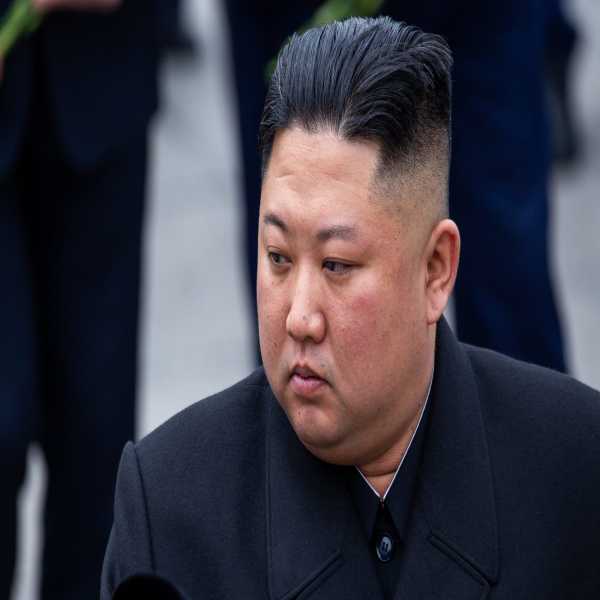While North Korea tests, China and Russia provide cover. How should the United States respond?

Last week, North Korea launched three ballistic missiles. One followed an unusual trajectory that administration officials believe may have included a re-entry vehicle. Another was an ICBM, North Korea’s sixth such shot this year. In all, the North has conducted 16 tests of 23 ballistic missiles of various ranges in 2022.
A joint statement issued Friday noted that the United States, Republic of Korea, and Japan were deeply concerned “about the May 25 DPRK launches of an intercontinental ballistic missile and shorter-range ballistic missiles.” Alas, the allies’ disapproval is unlikely to bother North Korean Supreme Leader Kim Jong-Un.
The allies pointed out that “Each of these launches violated multiple UNSC resolutions and posed a grave threat to the region and the international community.” These sentiments are similarly unlikely to impact Pyongyang’s decision-making. The Democratic People’s Republic of Korea might note that the five permanent members of the Security Council pay little attention to United Nations dictates because they are able to veto resolutions they don’t like. As for threatening other nations, that’s why the North is building missiles.
The U.S. proposed imposing new U.N. sanctions on the North, barring oil and tobacco exports to the DPRK. The former was to cripple the North Korean economy, while the latter presumably was intended to inconvenience Kim, a heavy smoker. However, both China and Russia vetoed the proposal, the first time since 2006 they blocked a new sanctions measure. The Chinese U.N. ambassador complained about the “negative effects and escalation of confrontation.” Russia’s U.N. ambassador “stressed the ineffectiveness and the inhumanity of further strengthening the sanctions pressure on Pyongyang.” Unstated but more important than the statements were the governments’ estrangement from Washington.
America’s U.N. ambassador Linda Thomas-Greenfield complained that the Security Council’s “restraint and silence has not eliminated or even reduced the threat. If anything, DPRK has been emboldened.” But the same could be said about imposing sanctions. Kim accelerated missile and nuclear developments in the 2010s even as sanctions were added and generally enforced by the People’s Republic of China. Moreover, the North Korean regime has survived more than two years of what amounted to self-sanctions, with the border sealed and enforced by guards with shoot-to-kill orders.
In any case, with China and Russia, which both backed a series of increasingly tough U.N. sanctions against the DPRK leading up to 2017, now sharply at odds with Washington, the sanctions policy is a dead end. Beijing has always been inclined to value stability over denuclearization, lest the North implode and potentially trigger massive waves of refugees, regime collapse, violent conflict, loose nuclear weapons, and regional instability. (Imagine how U.S. officials would respond to a similar situation in Mexico.) Today, China and Russia may view the North’s increasing armament as a potential geopolitical weapon against America. Neither country has complained about Pyongyang’s resumption of ICBM tests. The bet is that North Korea’s two big neighbors also would overlook a nuclear test.
Sanctions advocates usually respond to failure by asserting that the penalties were just not tough enough. Ratchet up pressure another notch and the target is sure to break! Then the lion will lie down with the lamb, a rousing round of Kumbaya will fill the air, and, in the case of North Korea, Kim will abandon his nukes.
Unfortunately, economic penalties have become Washington’s go-to policy not because they work, but because policymakers have no better idea for dealing with intractable problems. For instance, the U.S. government has punished the Cuban people for more than six decades and responded to successive failures—Fidel Castro’s remaining in power and becoming a global symbol of resistance to American imperialism—by imposing new sanctions. After he died, his brother Raúl took over and remains influential despite formally retiring. And the embargo continues.
In both Venezuela and Syria, the Trump administration decided to starve already-starving people to promote regime change, apparently operating under the assumption that both Nicolas Maduro and Bashar al-Assad would be moved by the plight of their people and quit. U.S. Ambassador Jim Jeffrey was cruel but honest when he admitted his objective was to turn Syria, which had been ravaged by years of civil war, into a “quagmire” for Russia by preventing desperate Syrians from rebuilding. Unfortunately, neither Maduro nor Assad have headed for the exits. The Communist Party still runs Cuba and has intensified its repression of the Cuban people. The living standard of Syrians, not Assad, have plummeted.
Similar results emerged from the more limited penalties imposed on Russia after its 2014 seizure of Crimea, and those on China for its behavior in Xinjiang and Hong Kong. Moreover, recall the effects of sanctions on Saddam Hussein’s Iraq, which then-U.N. Ambassador Madeleine Albright coldly justified as being “worth it” despite causing mass death while failing to force political change. In each of these cases, sanctions worked only in the sense of hurting the helpless. They were a complete failure in achieving their professed political ends. Governments rarely sacrifice political interests viewed as essential in response to foreign economic pressure.
The Biden administration needs to rethink its approach to the North. Increasing sanctions won’t bring Pyongyang to heel. China and Russia are more likely to obstruct than aid Washington against the North. The Biden administration has spent more than a year politely inviting Kim to talk without result. After the failure of the Hanoi summit, the DPRK contemptuously rejected Seoul’s diplomatic overtures. That policy is likely to continue, as newly inaugurated South Korean President Yoon Suk-yeol has insisted that it is up to North Korea whether the two countries resume bilateral talks.
Finally, the North’s abundant missile and nuclear arsenal—the DPRK is thought to possess enough nuclear material to produce perhaps two or three score bombs—makes, or should make, proposals for preventive war unthinkable. Even a half-dozen retaliatory strikes on, say, Seoul, Busan, Incheon, Daegu in the Republic of Korea, Guam, and Tokyo, would be devastating.
The U.S. and ROK appear to have settled on the alternative of taking “new and additional steps” to reinforce deterrence, whatever those steps might be. Yoon explained, “Every day we are seeing North Korea advancing its nuclear and missile capabilities, and President Biden and I share grave concerns—it is something that merits our utmost attention.”
No doubt, if the DPRK continues its present course, enhancing deterrence makes sense. However, the vital question is: Who should do the enhancing?
The elephant in the room is that the North threatens America only because America is threatening the North. Kim does not waste his time fulminating against Europe, or India, or Australia, or Latin America, or Africa. The North Korean regime has never indicated any interest in turning their cities into lakes of fire. These lands are of no interest to the DPRK, at least in terms of security.
Pyongyang threatens the U.S. because the former is afraid that Washington might intervene, whether preemptively or defensively alongside the South, a la 1950. Kim’s objective is to keep America out. And he is close to achieving this objective, since the U.S. has no answer to his build-up of nuclear weapons and missiles.
America’s vast military edge already deters the North from aggression against the U.S. Since Kim has no interest in leaving this world atop a radioactive funeral pyre, he won’t launch a first strike. However, if he attains a credible ability to hit the U.S. mainland—the evident objective of developing ballistic missiles—he will have established a significant deterrent against American intervention. U.S. officials may blather on about the inviolability of the alliance, but what president would risk the loss of American cities to defend the ROK?
Imagine the outbreak of conventional conflict on the peninsula (the specific circumstances wouldn’t much matter) with allied forces advancing on Pyongyang. Then, imagine that the Kim government warned the U.S. that unless it withdrew south of the DMZ, it would send nukes. That would mean the end of North Korea, but if Washington was bent on regime change anyway, why shouldn’t the North threaten to play the nuclear card? Would the president order a continued advance, betting that the DPRK was bluffing? Would he or she play geopolitical chicken with potentially millions of American lives at stake?
No president should be forced into such a position. Ensuring that never happens requires the U.S. to change its policy. First, Washington needs to tell Kim that it is willing to shift to arms control, that is, offering sanctions relief for verifiable limitations on the North’s nuclear development. Achieving agreement won’t be easy, but virtually no one in Washington believes that the DPRK’s leader is going to give up his nuclear arsenal. Seeking the impossible risks losing the feasible.
Second, the Biden administration needs to begin shifting responsibility for deterring the North to the ROK. South Korea’s economy is 50 or so times larger than North Korea’s. The South’s population is twice as large. Seoul possesses a vast technological edge, as well as an impressive international network of allies, friends, and partners. The ROK should do whatever is necessary to defend itself, which could include building nuclear weapons.
Indeed, the latter possibility could offer powerful negotiating leverage—not only with Pyongyang, but also Beijing and Moscow. China and Russia undoubtedly believe they benefit from the North’s ability to threaten the South and discomfit the U.S. However, the possibility of the DPRK provoking Seoul to become an independent nuclear power with Japan possibly to follow, would offer both China and Russia reason to try to reign in the North’s ambitions.
The outcome of such an approach would be unpredictable, and could be messy. However, it would allow Washington to back away, eliminating the greatest risk of a North Korean nuclear attack on America. And protecting the U.S., its people, territory, liberties, and prosperity, should be the priority of policymakers. With the status quo growing ever more dangerous, a change in policy is essential.
Northeast Asia appears to have entered a new world. The North is using missile tests not so much to prod America as to negotiate, to create a deadly deterrent targeting America. Complaining about Pyongyang’s behavior is no solution. Washington needs to change its approach to both North and South Korea to emphasize the interests of the American people.
Doug Bandow is a senior fellow at the Cato Institute. A former special assistant to President Ronald Reagan, he is author of several books, including Tripwire: Korea and U.S. Foreign Policy in a Changed World and co-author of The Korean Conundrum: America’s Troubled Relations with North and South Korea.
Sourse: theamericanconservative.com






